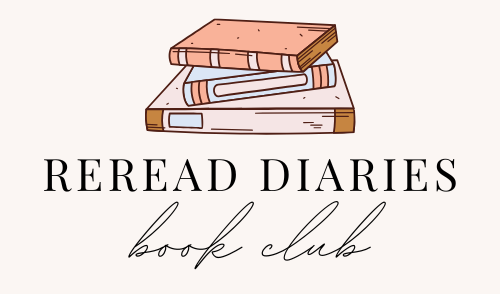The Reread Diaries: Introduction & Syllabus
Our own little book club here at head beyond home. Includes a two-year syllabus and an overview of the project.
I loved reading as a kid, as many of you probably did. Why would you be here otherwise? But there was something about being told what to read and when that caused me to recoil from the classics taught in the classroom. I can’t pinpoint why, exactly, I had such a vendetta against them at that exact moment in my youth — I read and read voraciously as a young person. It was just that I was more drawn to the glamour of commercial fiction and had little patience for parsing out the diction in some of the denser texts assigned to me.
I vaguely remember slogging through Of Mice and Men (my high school had a love affair with John Steinbeck). I vividly remember my sophomore English class reenacting the assassination of Julius Caesar on our teacher, which was witnessed by our principal in passing. I remember crying through The Things They Carried during assigned readings during junior year, and the arguments over Raskolnikov’s moral compass from Crime and Punishment in my final AP Literature course of my high school career. With all of these texts I utilized the teacher-dreaded Sparknotes because I was too busy reading The Hunger Games and later, Kurt Vonnegut’s entire literary collection, to care about the minute details.
Ironically, I now teach English and assign readings to my students. But while I’ve been developing a curriculum for my middle school students, I’ve been faced with some tough questions concerning the classics and their place in the modern classroom.
Looking back, I’m impressed with the readings my teachers assigned. In Oklahoma, where the average graduation rate in my home state hovers around the 80% mark for most demographics, I was lucky to be enrolled in a school district that had supports in place to help students surpass that statistical hurdle significantly. While my experience at the high school level was admittedly well-rounded compared to neighboring towns, I admit that I had the privilege of attending a public high school that had the funding to run advanced programming like AP courses and concurrent enrollment with the university across the street. I was lucky to have the school offer to pay for a certain number of those tests, and to encourage students to identify as intellectuals. Not every school district in the state, let alone the country, has those opportunities.
Nowadays, study of the classics in the public school setting is somewhat of a dying art. I discussed this in an article earlier in the year, where I broke down my relationship with reading trackers and their impact on my own literary health. I still use them, but I pay little attention to the social media aspect of the platforms compared to when I was younger and using them mostly for clout.
In some cases, I would argue the decentralization of classics in the curriculum is a step forward — there are more diverse books being integrated into the curriculum, more voices being heard, more cultures being welcomed into the classroom setting. But – and I have my own qualms saying this – the classics are a pillar of English education for a reason, one that helps individuals become well-rounded, thoughtful individuals who are capable of complex thinking and the ability to parse out complicated passages and to understand the overarching human experience. While there is undoubtedly a significant number of these classics written by dead white guys1, reading them in conjunction with more contemporary and inclusive texts may be the way forward. But as I’ve considered my own experience with the assigned readings I was given in high school, it makes me curious: have my ideas about these novels changed as I’ve also changed over the last fifteen years?
High School Reread Diaries
This series will be focused on rereading those classics assigned to me during my high school career — many of which are common texts in high schools across the United States. The benefit of rereading these classics lies in the familiarity, but it also allows us to approach the texts with fresher perspectives. I, for example, pick up one of my favorite post-modernist novels Breakfast of Champions by Kurt Vonnegut every few years, and I still find something new each time I revisit it. In this series, I invite you to read along, discuss, and break down these texts with me – there are so many places to talk about books here on Substack, and so I invite you to share your own thoughts or link essays from yourself or other writers related to the texts in the comments.
In the middle of each month, I’ll announce the next read of the series that we’ll begin reading together on the first of the next month. We’ll then have the next four or so weeks to reread (or read for the first time!) it together. It doesn’t matter if you haven’t touched a classic in the last decade or if you’re currently a high school student looking for a group of like-minded bookworms. We’re a community here, and I hope we can help one another foster a love of reading across a wide range of ages and experience.
The general syllabus will include the following texts, all taken from the required readings I actually was assigned in high school. Right now, they’re in no particular order and I most likely have forgotten one or two, so check back frequently. I’ll eventually include links to the final discussions/essays after the conclusion of the readings. I would also like to stress that this is a tentative timeline, as this project is for fun! You can always skip a month and come back to it the next. There is no pressure to read anything on this list.
The Syllabus
Summer/Fall 2025
And Then There Were None | Agatha Christie
Of Mice and Men | John Steinbeck
Romeo and Juliet | William Shakespeare
Night | Elie Wiesel
Beowulf | Anonymous
The Odyssey | Homer
Winter/Spring 2025-26
To Kill a Mockingbird | Harper Lee
The Old Man and the Sea | Ernest Hemingway
Animal Farm | George Orwell
Julius Caesar | William Shakespeare
The Adventures of Huckleberry Finn | Mark Twain
Things Fall Apart | Chinua Achebe
Summer/Fall 2026
1984 | George Orwell
The Grapes of Wrath | John Steinbeck
The Scarlet Letter | Nathaniel Hawthorne
The Crucible | Arthur Miller
The Things They Carried | Tim O’Brian
The Great Gatsby | F. Scott Fitzgerald
Macbeth | William Shakespeare
Winter/Spring 2026-27
Frankenstein | Mary Shelley
Hamlet | William Shakespeare
Crime and Punishment | Fyodor Dostoevsky
As I Lay Dying | William Faulkner
Siddhartha | Herman Hesse
The Stranger | Albert Camus
The Importance of Being Ernest | Oscar Wilde
This series will be dedicated to a collective understanding of literary history, but I acknowledge its weaknesses: many of these texts are from a purely Euro-centric perspective, and if you look closely, only about 10% of the authors on this list are women. No queer identities are included. And it’s worth mentioning there’s only a singular Black author of Nigerian descent. This gap in representation of diverse identities is partially the reason I want to reread these texts — I have a better understanding of the world fifteen years after being assigned to read them, a better understanding of representation in literature and pop culture, a better understanding of myself and how the media we consume has an impact on our worldviews.
Due to this recognized blind spot, I’m aiming to rewrite my experience with these texts. I’m aiming to post journal prompts and supplemental readings each week to help us (mostly me) move through the book with purpose and contextual understanding. I’d like to admit what I don’t know with curiosity, and so if you have suggested readings or articles for the book of the month, please feel free to point them out and send them my way. Those supplemental reading lists will likely be for paid subscriptions, but the articles and discussions about the book of the month will be available to all of my subscribers. Curriculum design is an area of my career that I actually love doing, so I'm looking forward to geeking out a bit and giving you all something worth thinking and talking about.
Finally, I’m hoping at the end of the month, we can get together to talk about the text(s) together. I am by no means an expert on everything, and I miss talking about books with others, especially ones who aren’t pre-teens (even if they are adorable). So, this’ll be our own little book club here at head beyond home.
This series is an experiment, in some ways, so I hope you join me on the journey.
See you next time,
Sam
Want to do more to support my work? Consider contributing to the tip jar.
Curious about micro fiction? Family secrets? Love and smalltown mystery? We’re Still Here is a serialized micro fiction series that takes place in small town Oklahoma, connecting there, the here, the hereafter. A series of questions, with a series of answers.
The General(ists) is a monthly newsletter with bits and bobs of everything — need something new to read? A cozy game to while away the time? A writing group to engage with? This is a place for those who can’t choose.
I say this facetiously but also know that it is true—many of the classical texts studied by middle and high schoolers, including essays, philosophy, and poetry, are predominantly produced by white men. That isn’t to say that a whole selection of classical works by women or racial minorities in the Euro-centric canon don’t exist. They do and are incredibly important. I highly recommend reading Virginia Woolf’s essay “Women and Fiction” for a more detailed literary and historical analysis. But, I would be remiss to discuss my reading experience as a student in public school without mentioning this particularly glaring issue.







